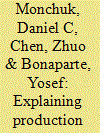| Srl | Item |
| 1 |
ID:
084930


|
|
|
| 2 |
ID:
095937


|
|
|
|
|
| Publication |
2010.
|
| Summary/Abstract |
In this paper we examine more closely the factors associated with production inefficiency in China's agriculture. The approach we take involves a two-stage process where output efficiency scores are first estimated using data envelopment analysis, and then in the second stage, variation in the resulting efficiency scores is explained using a truncated regression model with inference based on a semi-parametric bootstrap routine. Among the results we find that a heavy industrial presence is associated with reduced agricultural production efficiency and may be an indication that externalities from the industrial process, such as air and ground water pollution, affect agricultural production. We also find evidence that counties with a large percentage of the rural labor force engaged in agriculture tend to be less efficient, and suggests that nurturing and promoting growth of non-primary agriculture may lead to more efficient use of labor resources in agriculture.
|
|
|
|
|
|
|
|
|
|
|
|
|
|
|
|
| 3 |
ID:
110254


|
|
|
|
|
| Publication |
2012.
|
| Summary/Abstract |
Groenewold et al. (2004) documented that the Chinese stock market is inefficient. In this paper, we revisit the efficiency problem of the Chinese stock market using time-series model based trading rules. Our paper distinguishes itself from previous studies in several aspects. First, while previous studies concentrate on the viability of linear forecasting techniques, we evaluate the profitability of the forecasts of the self-exciting threshold autoregressive model (SETAR), and compare it with the conventional linear AR and MA trading rules. Second, the findings of market inefficiency in earlier studies mainly rest on the statistical significance of the autocorrelation or regression coefficients. In contrast, this paper directly examines the profitability of various trading rules. Third, our sample covers an extensive period of 1991-2010. Sub-sample analysis shows that positive returns mainly concentrate in the pre-SOE reform period, suggesting that China's stock market has become more efficient after the reform.
|
|
|
|
|
|
|
|
|
|
|
|
|
|
|
|